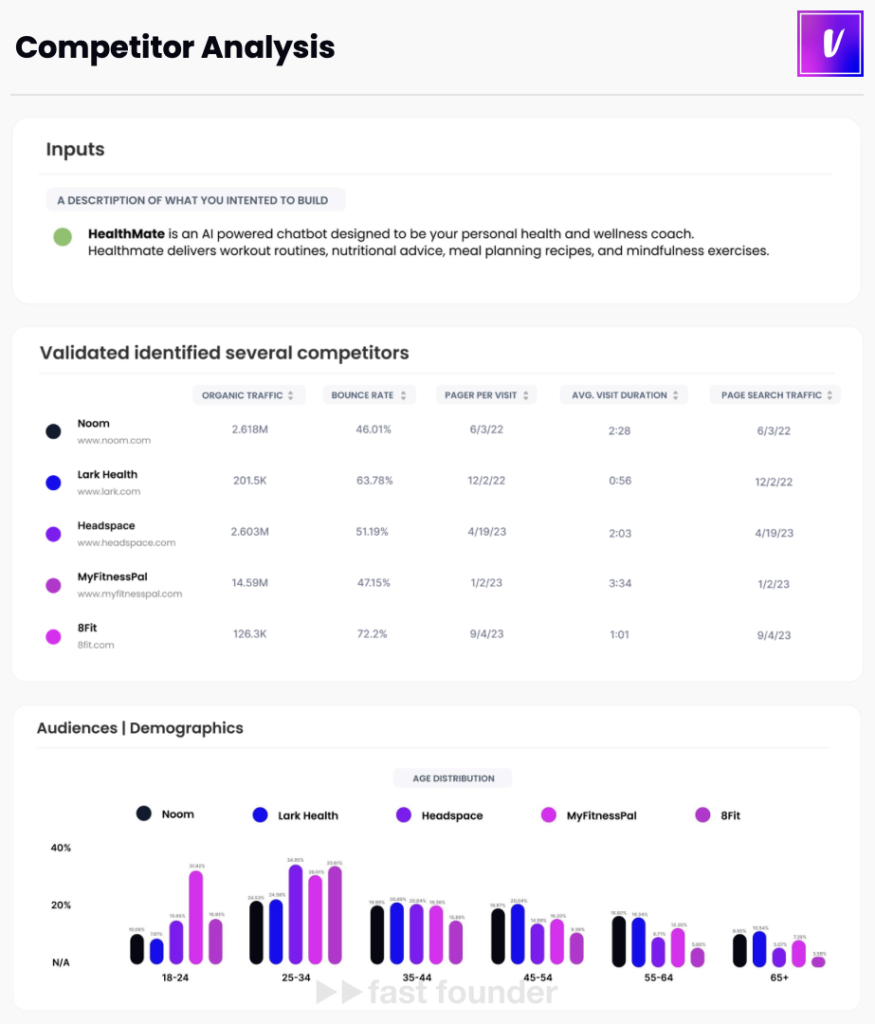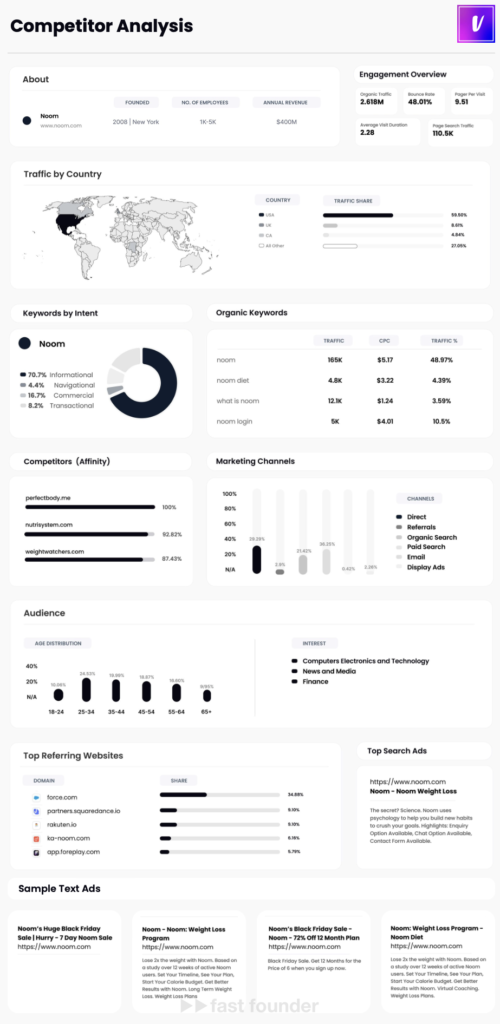In our own product, all properties seem important, all offers attractive, and everyone should buy it 😉 Although in reality, people will buy it for one main thing, presented in a certain way that resonates with specific individuals the most.
But can you quickly and inexpensively understand this right away? Yes, you can! If you use a platform like this, powered by AI. This is a completely new topic—applying AI to study users and obtain product insights.
So you can use this platform for yourself. Or you can decide to dive into this new topic yourself—starting by creating an analogue of this simple platform, and then expanding it into a more powerful product:
Project Essence
When a company (or startup) launches a new product, it’s crucial for them to understand what to focus on when promoting it. The problem is, one product may have:
several important properties from the developer’s perspective, multiple potential target audiences, several ways to present the same product to customers.

Validated helps companies understand what their future customers want the most and what to focus on in its advertising.

To achieve this, you need to upload a description of your product to the platform, after which the AI engine will automatically create and launch various advertising options mentioning different product properties, with different offers, different presentation styles, and targeted at different audiences.
Then it gathers statistics on clicks for different options. Roughly speaking, what gets more clicks is what should be promoted 😉

For example, here’s how Validated dealt with a mobile app for a healthy lifestyle—offering users physical exercise routines, mindfulness and stress relief exercises, nutrition tips, and recipes for healthy cooking.


The platform’s AI engine automatically created 80 advertising variations, spent $418 on their promotion, garnered 66 thousand impressions, and 993 clicks—and based on this, provided its recommendations.

The most compelling value proposition turned out to be “reducing the incidence of diseases, injuries, and other health problems.”

This message appeared to be equally appealing to both men and women.
However, it was entirely uninteresting for middle-aged people 😉 The most receptive audience turned out to be young men and women aged 18 to 24, women aged 55 and men aged 65.

Currently, Validated has launched a new feature in beta version—automated competitor analysis for the client’s presented product.

The platform’s AI engine will understand on its own what criteria to use to search for competitors and will compile a list of them with data on their website traffic and visitor demographics.

Moreover, it will provide a more detailed analysis of each identified competitor—visitor geography, overall traffic source distribution, keywords they are found for in searches, which of their search ads get more clicks, the most popular texts of their ads, and which sites link to them the most.
Thus, they end up with something like Similarweb—but at a much more affordable price, albeit only for their competitors.

The startup was founded only in the summer of 2023, but it has already managed to attract its first clients. Currently, Validated has raised its first investment of $1.1 million.
What’s Interesting
Someone will probably say again that today’s Validated is “just another wrapper around ChatGPT” ☹️ Although they might use another AI technology 😉
And there doesn’t seem to be anything new in the product components—after all, there are already AI platforms for automatically creating ads, automatically running them, and analyzing the results.
But a “product” is not about the technologies. A product is about the ability to assemble already known building blocks in a new configuration to solve specific user tasks!
I even wrote about this not so long ago on the Dark Side precisely about “wrappers around ChatGPT”.
- I often hear “true startupers” contemptuously calling AI startups “GPT fanboys”. Meaning that they are just a wrapper—inside which are hidden ChatGPT calls (OpenAI API) with the right prompts.
- The contempt arises because these startups don’t invent anything. They take ready-made technology, cover it in icing, wrap it in a pretty wrapper—and sell it. And some consider this cheating.
- Although the critical skill of a startup is not to invent—but to create demanded products. And sometimes to do this, you have to invent. But that’s not the goal, it’s a burden 😉
- That’s why I applaud startups that can create demanded products “on a silver platter”. Because they focus on finding demand and selling value. Not on “these wonderful 99 features our team of 10 programmers developed over 2 years”.
- I’m occasionally asked: “How to learn to create demanded products?”. It seems that now there’s an excellent way to do this—try creating and selling “GPT fanboys” yourself.
- Creating them is quick and easy—so all the time and brainpower should only go into finding what, to whom, and in what form you can sell. And this is the best training for the skill of creating demanded products. By the way, as a result, you can really end up with a demanded product that you can further develop 😉
Well, in general, the use of AI for obtaining product insights is now forming into a separate direction.

As an example, we can mention the startup Outset from the recent Y Combinator batch, which I wrote about in November. They made an AI interviewer that can autonomously conduct targeted interviews with users about existing or upcoming products—and automatically extract useful insights from them. Outset raised $4.9 million in investments.

Another example is the startup Knit, which I wrote about in the summer of 2022. They first made a platform for conducting video interviews with users, focusing on Generation Z. In 2023, they added AI to their platform, moving in a direction similar to Outset. Knit raised $5.6 million in investments.
Where to Head
The first most general conclusion is that it seems worth stopping the wholesale contempt for any “wrappers around ChatGPT”. Many good products, for example, from a technological point of view, consist of a set of quite simple operations with relational databases like MySQL, Postgres, or Oracle—but they are not called “wrappers around databases” for some reason 😉
And the general direction of possible movement within this conclusion is to really try to make your own “wrapper around ChatGPT”, offering users a simple and convenient tool to solve some of their tasks.
If by this simple means it is possible to successfully meet their needs—then you can further develop this “wrapper” into a full-fledged product with a more sophisticated set of features. But any complex product is the result of the gradual development of a simple product. So “wrappers around ChatGPT” are a good modern tool for creating minimal viable products.
It’s tempting to organize a competition among FF readers to create such “wrappers”. Moreover, to judge not at the idea level—but based on the results of real sales! And why not? After all, it won’t take much time to create such a product, and not much money for advertising to test its demand. But you’ll be able to “practice on cats” in creating demanded products. Don’t want to give it a try? 😉
Returning to the topic of today’s startup, as I mentioned earlier, AI platforms for studying demand, collecting and analyzing feedback on products are now emerging as a separate direction. Within which new products are emerging and existing ones are developing. This could be a specific direction of potential movement.

By the way, there are also big players here. For example—startup Zappi with a platform for finding product insights, which I wrote about at the end of 2022. This startup raised $192.7 million in investments, with $170 million of them in the last round—when it began to more actively use AI technologies.
About the Company
Validated
Website: getvalidated.ai
Latest Round: $1.1M, 15.01.2024
Total Investments: $1.1M, Rounds: 1
